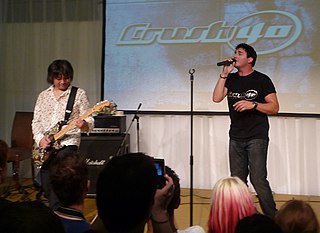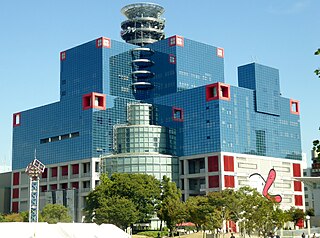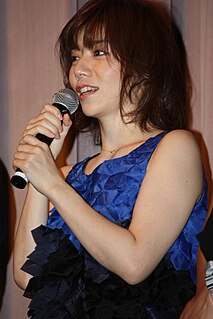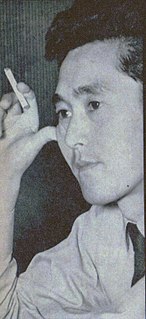
Shibata is a city in Niigata Prefecture, Japan. As of 1 July 2019, the city had an estimated population of 95,653 in 36,569 households, and a population density of 179 persons per km². The total area of the city was 533.10 square kilometres (205.83 sq mi).

Crush 40 is a Japanese-American hard rock band. The group consists of guitarist and composer Jun Senoue and vocalist Johnny Gioeli, although Senoue has featured other lead vocalists on a Crush 40 album. Crush 40 is best known for their contributions to the Sonic the Hedgehog video game series.

Kansai Television Company Limited, often called Kansai TV or Kantele (カンテレ), is a tv station affiliated with Fuji News Network (FNN) and Fuji Network System (FNS) in Osaka, serving the Kansai region of Japan. Kansai TV is a company affiliated in Hankyu Hanshin Holdings Group of Hankyu Hanshin Toho Group.

Jun Shibata, nicknamed "Shibajun", is a Japanese pop female singer-songwriter. In 2016 she was diagnosed with partial hearing loss.
"It's No Game" is a song written by David Bowie for the 1980 album Scary Monsters , featuring lead guitar played by Robert Fripp. The song is in two parts, opening and closing the album.
Sambomaster is a Japanese rock band signed by Sony Music Japan. The band's name, Sambomaster, refers to the Russian martial art called Sambo.

Kōdai-in (高台院), formerly known as Nene (ねね), One (おね), Nei (ねい), was an aristocrat and Buddhist nun, founder of the temple Kōdai-ji in Kyoto, Japan. She was formerly the principal samurai wife of Toyotomi Hideyoshi under the name of Toyotomi Yoshiko. When she rose in higher political status, she took the title of "Kita no mandokoro". As the matriarch figure of the Toyotomi clan, she led all diplomatic affairs that had to do with the imperial court, and monitored the daimyos' families who were being held hostage at Osaka Castle.

King Arthur and the Knights of the Round Table is a Japanese anime series based on Arthurian legend. Produced by Toei Animation, the series consists of 30 half-hour episodes released between 9 September 1979 and 3 March 1980. The series achieved great popularity in its non-English translations.
Hidenori Tokuyama is a Japanese actor and singer. A fan of tokusatsu, Tokuyama has had a role in several series, most notably Sou Yaguruma/Kamen Rider TheBee/Kamen Rider KickHopper in Kamen Rider Kabuto and Hiroto Sutō/Go-on Gold in Engine Sentai Go-onger.
Lite, stylized as LITE, is a Japanese math rock band that has been termed "one of Japan's top instrumental rock acts." The band's members are Nobuyuki Takeda (guitar), Kozo Kusumoto, Jun Izawa (bass), and Akinori Yamamoto (drums).

Nao Ōmori, sometimes credited as Nao Ohmori or Nao Omori, is a Japanese actor. He was given the Best Supporting Actor award at the 2004 Yokohama Film Festival.

National Route 113 is a highway in Japan on the island of Honshū which runs from Niigata City in Niigata Prefecture to Sōma in Fukushima Prefecture.

Toyosaka Station is a railway station on the Hakushin Line in Kita-ku, Niigata, Japan, operated by East Japan Railway Company.

Koreyoshi Kurahara was a Japanese screenwriter and director. He is perhaps best known for directing Antarctica (1983), which won several awards and was entered into the 34th Berlin International Film Festival. He also co-directed Hiroshima (1995) with Roger Spottiswoode, which was nominated for the Primetime Emmy Award for Outstanding Miniseries.

Oort no Kumo is Jun Shibata's 1st studio album. It was released on 20 March 2002 and peaked at #59 in the Oricon Weekly Albums Chart.

Tameiki (Sigh) is Jun Shibata's second studio album and best-selling to date. It was released on February 26, 2003 and peaked at No. 12 in Japan.

Single Collection is Jun Shibata's first compilation album. It was released on September 21, 2005, and peaked at No. 23 in Japan.

"Miseinen" (Underage) is Jun Shibata's 8th single. It was released on January 28, 2004 and peaked at #20.

"Sore dewa, Mata Ashita" ) is a song by Japanese rock band Asian Kung-Fu Generation. It was released on July 25, 2012 and reached number 11 on the Oricon charts, make them failed to enter Top 10 since Kimi to Iu Hana. It was used as the theme song for Road to Ninja: Naruto the Movie and one of three song by Asian Kung-Fu Generation in the Naruto media, alongside Haruka Kanata and Blood Circulator. The song was ranked 9th on fans request for band's 10th anniversary live setlist on September 14, 2013.

"Blood Circulator" is a song by Japanese rock band Asian Kung-Fu Generation. It was released on July 13, 2016 and reached number 13 on the Oricon. It was used as the third opening for the 20th season of the anime Naruto Shippuden and the third song by Asian Kung-Fu Generation in the Naruto media, after "Haruka Kanata" and "Sore dewa, Mata Ashita". Masafumi Gotō said, "The offer came to places where there was no song, no idea, no time, but I could not find a reason to refuse, I thought that I had to write down even while I was sleeping." Single's B-side, Hakkei, sung by band's guitarist, Kensuke Kita. This is the fourth time since Re:Re:'s B-side, "Time Traveller" in 2016.














